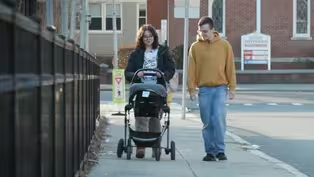
Weekly Insight
Clip: Season 5 Episode 10 | 6m 7sVideo has Closed Captions
WPRI 12’s Ted Nesi explains what’s being done to address Rhode Island’s housing crisis.
Rhode Island Housing Secretary Stefan Pryor says the state has the worst housing production rate in the continental United States. Rhode Island PBS Weekly’s Michelle San Miguel and WPRI 12’s Politics Editor Ted Nesi discuss why there’s not enough housing being produced to keep up with demand.
Problems playing video? | Closed Captioning Feedback
Problems playing video? | Closed Captioning Feedback
Rhode Island PBS Weekly is a local public television program presented by Rhode Island PBS

Weekly Insight
Clip: Season 5 Episode 10 | 6m 7sVideo has Closed Captions
Rhode Island Housing Secretary Stefan Pryor says the state has the worst housing production rate in the continental United States. Rhode Island PBS Weekly’s Michelle San Miguel and WPRI 12’s Politics Editor Ted Nesi discuss why there’s not enough housing being produced to keep up with demand.
Problems playing video? | Closed Captioning Feedback
How to Watch Rhode Island PBS Weekly
Rhode Island PBS Weekly is available to stream on pbs.org and the free PBS App, available on iPhone, Apple TV, Android TV, Android smartphones, Amazon Fire TV, Amazon Fire Tablet, Roku, Samsung Smart TV, and Vizio.
Providing Support for PBS.org
Learn Moreabout PBS online sponsorship- Ted, it's always good to have you back.
You and your colleagues at WPRI 12 recently aired this week-long series, "Taking a look at the housing crisis in Rhode Island," and I saw on social media a lot of people were commenting.
What were viewers telling you?
- Well, Michelle, obviously we knew there was a lot of interest in this.
We wouldn't have done a big series if we didn't.
But I was still, I guess, surprised by the level of feedback we got, which reinforced to me that this has become an almost universal concern in Rhode Island, in New England, frankly, the cost of housing.
We heard from renters who said they were getting letters, "My rent's gonna go up $300, I can't afford it, but I can't do anything out of it.
There no other apartments."
And of course we heard from people who either wanna buy a home or need to buy a bigger home if their family's expanding, who just feel like there's nothing on the market and no sign it's gonna get better.
So people are frustrated and worried about it.
- For me, one of the big takeaways was that we have known about this problem, the housing crisis, long before the pandemic.
We have had warnings this is looming.
You had talked about in one of your stories, this 2016 Rhode Island housing report, which showed that Rhode Island needed to build between 34,000 and 40,000 housing units over the next decade to avoid a crisis.
Here we are eight years later and we've only built half of that.
Why has construction been so slow?
- Well, of course, Michelle, nobody affirmatively said, "Why don't we a create a housing crisis by not building enough?"
It was really, it's all these little decisions and the piling up of them.
So obviously, in the northeast, cities and towns have enormous control over what gets built, with zoning restrictions and things like that.
And so, each time one city or town makes things more restrictive, rejects a new development, it might seem small on the local level, but when you replicate that over all 39 Rhode Island cities and towns, and then you had the state until recently taking a very hands-off approach, that's how you wind up with a crisis to the degree Rhode Island finds itself in now.
- And it's not just a Rhode Island problem.
In neighboring Massachusetts, the attorney general's office is suing the town of Milton, because Rhoders there rejected a plan that would have allowed for more multifamily housing to be built.
Here in Rhode Island, are you seeing cities and towns taking similar measures, making housing more difficult for certain people?
- Well, nothing yet as dramatic as what's going on in Milton.
And we now see other Massachusetts cities threatening.
Wrentham is one of them to potentially also sue, get into a legal battle.
But you are seeing pushback to the steps state leaders have taken recently, kind of forced cities and towns to be more welcoming to housing growth.
Speaker Shekarchi has called out Narraganset as one that's taken some steps to kinda push back against his efforts to make it easier to build housing.
I believe Tiverton has a short-term development moratorium in place, and you've seen planners in multiple cities sort of complain frankly, that this is a lot of work to revamp our zoning code and we don't necessarily want control to be in at the state level.
So I think you're gonna see those tensions keep rising if the state leaders keep pushing for more growth.
- And in recent years we have seen elected officials in Rhode Island take more action to address the housing crisis.
Of course, speaker Shekarchi is one of the people who's really taken this as his main issue that he's focused on.
Hundreds of millions of dollars had been poured into this.
We now have a housing secretary.
That position only began a few years ago.
Your colleague over at Channel 12, Tim White, recently sat down with Housing Secretary Stefan Pryor to get an answer as to when can we really expect to see significant increases in housing.
Let's take a listen to that conversation.
- When does that money start translating into units?
Give me a date.
- Well, there's no single date, because every development is different.
But it's gonna take years.
It is going to take years.
So we've charted this out.
We're looking at the projects individually.
- Two years, three years, five years?
- Some of these developments that are being financed now, it'll be three years.
- We'll start seeing things.
- On the edge, even four, when they're done.
But in a couple years, we'll see a lot of 'em.
- Ted, Secretary Pryor's answer obviously is going to disappoint a lot of people.
- Yeah, I mean, they've put a lot of money into housing, as you said, in the setup there, Michelle, and it's gonna take time to even see results.
Construction costs are part of the reason for that, the complexity of finding enough financing for housing.
But one other thing that the secretary said that really hit home to me was the fact he said even if Rhode Island reached the level of two to 3,000 housing units a year, which is what they say is needed to sort of keep up with demand, he said that wouldn't even start to bring down prices to make things more affordable.
That's a treading water level of housing construction for Rhode Island.
And he said we're not even close yet to doing that, let alone something that would really bring down prices.
So Rhode Island's dug itself a pretty deep hole.
And it's gonna take quite a while, I think, to get out of it if people want to get out of it.
- Yeah, so we're talking about there are no short-term solutions to this.
- No quick fixes.
Nope.
- Thank you so much, Ted.
Always good to have you.
- Good to be here.
(cheerful music) (cheerful music continues)
Video has Closed Captions
Clip: S5 Ep10 | 12m 4s | Rhode Island PBS Weekly explores teen parenting and efforts to reduce teen pregnancy. (12m 4s)
Video has Closed Captions
Clip: S5 Ep10 | 5m 37s | Filmmaker Jason Allard explores abandoned buildings across New England. (5m 37s)
Providing Support for PBS.org
Learn Moreabout PBS online sponsorshipSupport for PBS provided by:
Rhode Island PBS Weekly is a local public television program presented by Rhode Island PBS













